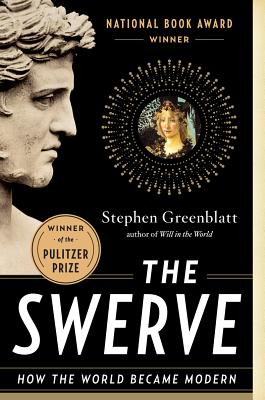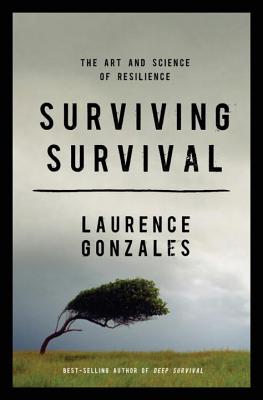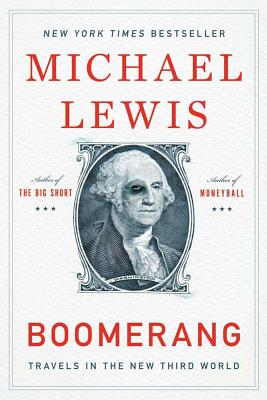Winner of the 2012 Pulitzer Prize for Non-Fiction
Winner of the 2011 National Book Award for Non-Fiction
One of the world's most celebrated scholars, Stephen Greenblatt, has crafted both an innovative work of history and a thrilling story of discovery, in which one manuscript, plucked from a thousand years of neglect, changed the course of human thought and made possible the world as we know it.
Nearly six hundred years ago, a short, genial, cannily alert man in his late thirties took a very old manuscript off a library shelf, saw with excitement what he had discovered, and ordered that it be copied. That book was the last surviving manuscript of an ancient Roman philosophical epic, On the Nature of Things, by Lucretius—a beautiful poem of the most dangerous ideas: that the universe functioned without the aid of gods, that religious fear was damaging to human life, and that matter was made up of very small particles in eternal motion, colliding and swerving in new directions.
The copying and translation of this ancient book-the greatest discovery of the greatest book-hunter of his age-fueled the Renaissance, inspiring artists such as Botticelli and thinkers such as Giordano Bruno; shaped the thought of Galileo and Freud, Darwin and Einstein; and had a revolutionary influence on writers such as Montaigne and Shakespeare and even Thomas Jefferson.
On a small snow-covered island—so tiny that it can’t be found on any map—lives twelve-year-old Minou, her philosopher Papa (a descendent of Descartes), Boxman the magician, and a clever dog called No-Name. A year earlier Minou’s mother left the house wearing her best shoes and carrying a large black umbrella. She never returned.
One morning Minou finds a dead boy washed up on the beach. Her father decides to lay him in the room that once belonged to her mother. Can her mother’s disappearance be explained by the boy? Will Boxman be able to help find her? Minou, unwilling to accept her mother’s death, attempts to find the truth through Descartes’ philosophy. Over the course of her investigation Minou will discover the truth about loss and love, a truth that The Vanishing Act conveys in a voice that is uniquely enchanting.
You have survived the crisis—trauma, disease, accident, or war—now how do you get your life back?
The shark attacked while she was snorkeling, tearing through Micki Glenn’s breast and shredding her right arm. Her husband, a surgeon, saved her life on the spot, but when she was safely home she couldn’t just go on with her life. She had entered an even more profound survival journey: the aftermath.
The survival experience changes everything because it invalidates all your previous adaptations, and the old rules don’t apply. In some cases survivors suffer more in the aftermath than they did during the actual crisis. In all cases, they have to work hard to reinvent themselves. Drawing on gripping cases across a wide range of life-threatening experiences, Laurence Gonzales fashions a compelling argument about fear, courage, and the adaptability of the human spirit. Micki Glenn was later moved to say: “I don’t regret that this happened to me. [It] has been . . . probably the single most positive experience I’ve ever had.”
Winner of the 2011 National Book Award for Non-Fiction
One of the world's most celebrated scholars, Stephen Greenblatt, has crafted both an innovative work of history and a thrilling story of discovery, in which one manuscript, plucked from a thousand years of neglect, changed the course of human thought and made possible the world as we know it.
Nearly six hundred years ago, a short, genial, cannily alert man in his late thirties took a very old manuscript off a library shelf, saw with excitement what he had discovered, and ordered that it be copied. That book was the last surviving manuscript of an ancient Roman philosophical epic, On the Nature of Things, by Lucretius—a beautiful poem of the most dangerous ideas: that the universe functioned without the aid of gods, that religious fear was damaging to human life, and that matter was made up of very small particles in eternal motion, colliding and swerving in new directions.
The copying and translation of this ancient book-the greatest discovery of the greatest book-hunter of his age-fueled the Renaissance, inspiring artists such as Botticelli and thinkers such as Giordano Bruno; shaped the thought of Galileo and Freud, Darwin and Einstein; and had a revolutionary influence on writers such as Montaigne and Shakespeare and even Thomas Jefferson.
On a small snow-covered island—so tiny that it can’t be found on any map—lives twelve-year-old Minou, her philosopher Papa (a descendent of Descartes), Boxman the magician, and a clever dog called No-Name. A year earlier Minou’s mother left the house wearing her best shoes and carrying a large black umbrella. She never returned.
One morning Minou finds a dead boy washed up on the beach. Her father decides to lay him in the room that once belonged to her mother. Can her mother’s disappearance be explained by the boy? Will Boxman be able to help find her? Minou, unwilling to accept her mother’s death, attempts to find the truth through Descartes’ philosophy. Over the course of her investigation Minou will discover the truth about loss and love, a truth that The Vanishing Act conveys in a voice that is uniquely enchanting.
You have survived the crisis—trauma, disease, accident, or war—now how do you get your life back?
The shark attacked while she was snorkeling, tearing through Micki Glenn’s breast and shredding her right arm. Her husband, a surgeon, saved her life on the spot, but when she was safely home she couldn’t just go on with her life. She had entered an even more profound survival journey: the aftermath.
The survival experience changes everything because it invalidates all your previous adaptations, and the old rules don’t apply. In some cases survivors suffer more in the aftermath than they did during the actual crisis. In all cases, they have to work hard to reinvent themselves. Drawing on gripping cases across a wide range of life-threatening experiences, Laurence Gonzales fashions a compelling argument about fear, courage, and the adaptability of the human spirit. Micki Glenn was later moved to say: “I don’t regret that this happened to me. [It] has been . . . probably the single most positive experience I’ve ever had.”
A masterpiece of science reporting that tracks the animal origins of emerging human diseases.
The emergence of strange new diseases is a frightening problem that seems to be getting worse. In this age of speedy travel, it threatens a worldwide pandemic. We hear news reports of Ebola, SARS, AIDS, and something called Hendra killing horses and people in Australia—but those reports miss the big truth that such phenomena are part of a single pattern. The bugs that transmit these diseases share one thing: they originate in wild animals and pass to humans by a process called spillover. David Quammen tracks this subject around the world. He recounts adventures in the field—netting bats in China, trapping monkeys in Bangladesh, stalking gorillas in the Congo—with the world’s leading disease scientists. In Spillover Quammen takes the reader along on this astonishing quest to learn how, where from, and why these diseases emerge, and he asks the terrifying question: What might the next big one be?
Three decades in the making, one of the most ambitious and comprehensive histories of political philosophy in nearly a century.
Both a history and an examination of human thought and behavior spanning three thousand years, On Politics thrillingly traces the origins of political philosophy from the ancient Greeks to Machiavelli in Book I and from Hobbes to the present age in Book II. Whether examining Lord Acton’s dictum that “absolute power corrupts absolutely” or explicating John Stuart Mill’s contention that it is “better to be a human dissatisfied than a pig satisfied,” Alan Ryan evokes the lives and minds of our greatest thinkers in a way that makes reading about them a transcendent experience. Whether writing about Plato or Augustine, de Toqueville or Thomas Jefferson, Ryan brings a wisdom to his text that illuminates John Dewey’s belief that the role of philosophy is less to see truth than to enhance experience. With this unparalleled tour de force, Ryan emerges in his own right as one of the most influential political philosophers of our time.
As Pogo once said, "We have met the enemy and he is us."
The emergence of strange new diseases is a frightening problem that seems to be getting worse. In this age of speedy travel, it threatens a worldwide pandemic. We hear news reports of Ebola, SARS, AIDS, and something called Hendra killing horses and people in Australia—but those reports miss the big truth that such phenomena are part of a single pattern. The bugs that transmit these diseases share one thing: they originate in wild animals and pass to humans by a process called spillover. David Quammen tracks this subject around the world. He recounts adventures in the field—netting bats in China, trapping monkeys in Bangladesh, stalking gorillas in the Congo—with the world’s leading disease scientists. In Spillover Quammen takes the reader along on this astonishing quest to learn how, where from, and why these diseases emerge, and he asks the terrifying question: What might the next big one be?
Three decades in the making, one of the most ambitious and comprehensive histories of political philosophy in nearly a century.
Both a history and an examination of human thought and behavior spanning three thousand years, On Politics thrillingly traces the origins of political philosophy from the ancient Greeks to Machiavelli in Book I and from Hobbes to the present age in Book II. Whether examining Lord Acton’s dictum that “absolute power corrupts absolutely” or explicating John Stuart Mill’s contention that it is “better to be a human dissatisfied than a pig satisfied,” Alan Ryan evokes the lives and minds of our greatest thinkers in a way that makes reading about them a transcendent experience. Whether writing about Plato or Augustine, de Toqueville or Thomas Jefferson, Ryan brings a wisdom to his text that illuminates John Dewey’s belief that the role of philosophy is less to see truth than to enhance experience. With this unparalleled tour de force, Ryan emerges in his own right as one of the most influential political philosophers of our time.
As Pogo once said, "We have met the enemy and he is us."
The tsunami of cheap credit that rolled across the planet between
2002 and 2008 was more than a simple financial phenomenon: it was
temptation, offering entire societies the chance to reveal aspects of
their characters they could not normally afford to indulge.
Icelanders wanted to stop fishing and become investment bankers. The Greeks wanted to turn their country into a piñata stuffed with cash and allow as many citizens as possible to take a whack at it. The Germans wanted to be even more German; the Irish wanted to stop being Irish.
Michael Lewis's investigation of bubbles beyond our shores is so brilliantly, sadly hilarious that it leads the American reader to a comfortable complacency: oh, those foolish foreigners. But when he turns a merciless eye on California and Washington, DC, we see that the narrative is a trap baited with humor, and we understand the reckoning that awaits the greatest and greediest of debtor nations.
Icelanders wanted to stop fishing and become investment bankers. The Greeks wanted to turn their country into a piñata stuffed with cash and allow as many citizens as possible to take a whack at it. The Germans wanted to be even more German; the Irish wanted to stop being Irish.
Michael Lewis's investigation of bubbles beyond our shores is so brilliantly, sadly hilarious that it leads the American reader to a comfortable complacency: oh, those foolish foreigners. But when he turns a merciless eye on California and Washington, DC, we see that the narrative is a trap baited with humor, and we understand the reckoning that awaits the greatest and greediest of debtor nations.






No comments:
Post a Comment